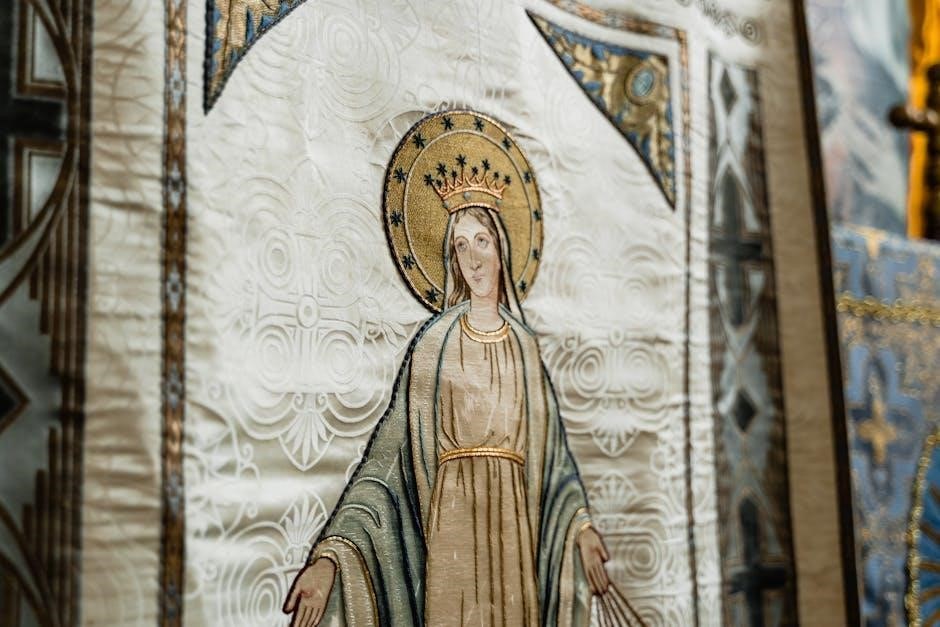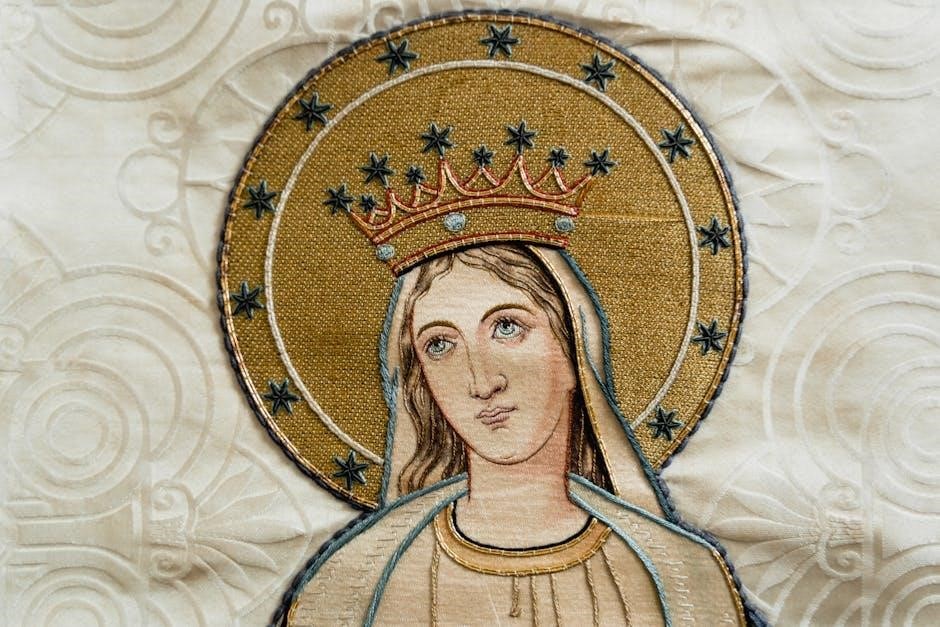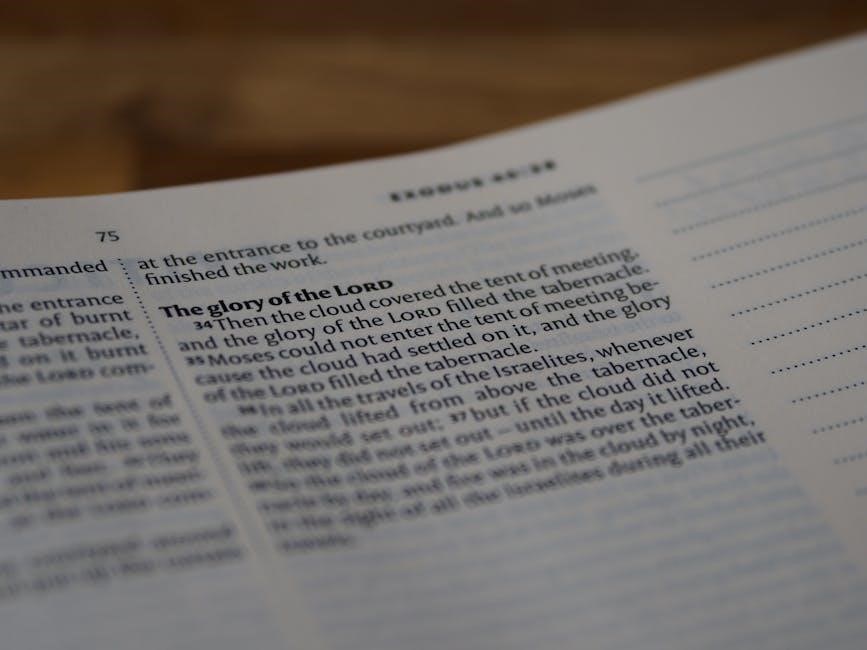
significance of 40 in the bible pdf
Discover the profound spiritual significance of the number 40 in the Bible. Explore its role in key biblical events and symbolism in our free PDF guide.
The number 40 holds profound symbolic meaning in the Bible, representing periods of testing, transformation, and new beginnings. It recurrently appears in key biblical narratives, signifying spiritual trials, divine preparation, and transition.
Overview of the Number 40’s Prominence in Scripture

The number 40 is a recurring and significant figure in the Bible, appearing 158 times, primarily in the Old Testament. It symbolizes periods of testing, trial, and transformation, often marking divine preparation or transition. From Noah’s 40 days of rain to Moses’ 40 years in the wilderness, and Jesus’s 40-day fast, the number consistently represents a time of spiritual refinement. Its prominence underscores themes of endurance, reflection, and new beginnings, highlighting its role in shaping biblical narratives and theological meanings. The frequent use of 40 emphasizes its symbolic importance, connecting it to generations, judgment, and the journey toward spiritual growth.
Thematic Importance of 40 in Biblical Narratives
The number 40 is deeply woven into biblical themes, symbolizing transformation, preparation, and divine judgment. It often marks the transition from one significant phase to another, such as Moses’ 40 years in the wilderness preparing for leadership or Jesus’s 40-day fast before His ministry. This recurring motif underscores periods of trial and spiritual growth, emphasizing faith and endurance. The number also signifies new beginnings, like the 40 days after Christ’s resurrection, symbolizing renewal and the dawn of a new covenant. Through these narratives, 40 emerges as a powerful symbol of God’s plan, connecting human struggle with divine purpose and highlighting the transformative power of perseverance.

Key Biblical Events Involving the Number 40
The number 40 is significant in key biblical events, such as Noah’s Flood, the Exodus, and Jesus’s temptation, symbolizing divine trials and transformation periods.
Noah’s Flood: 40 Days and Nights of Rain

The biblical account of Noah’s Flood marks one of the most significant events associated with the number 40. According to Genesis 7:12, rain fell upon the earth for 40 days and nights, symbolizing God’s judgment and cleansing of humanity. This period represented a divine intervention to reset creation, eradicating wickedness while preserving righteousness through Noah and his family. The 40 days signified a complete cycle of judgment, after which a new beginning emerged. This event underscores the theme of transformation and renewal, as the floodwaters receded, revealing a refreshed earth. The number 40 here embodies a period of divine action, leading to a fresh start, reflecting both judgment and mercy. This narrative remains a cornerstone in understanding the symbolic depth of 40 in biblical history.
The Exodus: 40 Years in the Wilderness
The Israelites’ 40-year journey in the wilderness is a pivotal event in the Bible, symbolizing a period of divine testing and preparation; After their deliverance from Egypt, God led them into the wilderness, where they faced trials that refined their faith and readied them for the Promised Land. The 40 years represented a complete cycle of transformation, as an entire generation passed, ensuring only those faithful to God’s covenant would enter Canaan. This period underscored themes of patience, obedience, and trust in divine providence. The wilderness experience became a metaphor for spiritual growth, teaching that true freedom and blessing often follow seasons of trial and perseverance. The number 40 here emphasizes the necessity of preparation before entering a new phase of God’s plan.
Jesus’s Temptation: 40 Days in the Wilderness
Jesus’s 40-day fast in the wilderness is a profound example of spiritual testing and preparation. Before beginning His ministry, Jesus was led by the Holy Spirit into the wilderness, where He fasted for 40 days and nights. This period mirrored the Israelites’ 40 years of wilderness wandering, symbolizing a time of divine testing and alignment with God’s will. During this time, Jesus faced three temptations from Satan, each targeting His humanity and mission. His victory over these temptations demonstrated His obedience, self-denial, and reliance on Scripture. The 40 days prepared Jesus for His public ministry, embodying themes of spiritual warfare, humility, and trust in God. This event underscores the biblical significance of 40 as a period of trial leading to transformation and divine purpose.
The 40 Days After Christ’s Resurrection
The 40 days following Christ’s resurrection hold profound significance in the biblical narrative. During this period, Jesus appeared to His disciples on multiple occasions, providing undeniable proof of His resurrection and teaching them about the kingdom of God. This time was crucial for preparing the disciples to fulfill their mission after His ascension. The 40 days symbolize a transitional phase, bridging the gap between Christ’s resurrection and the outpouring of the Holy Spirit at Pentecost; It also reflects the biblical pattern of 40 as a time of preparation and transformation. This period emphasized Christ’s victory over death and His role as the foundation of the church, leaving His followers empowered to spread His message to the world.

Spiritual and Symbolic Meanings of 40
The number 40 symbolizes transformation, testing, and new beginnings, representing a divine period of preparation for spiritual growth and renewal in biblical narratives.
40 as a Period of Testing and Trial
The number 40 in the Bible often represents a period of testing and trial, signifying spiritual purification and preparation. It underscores themes of endurance and faith, as seen in Noah’s 40 days of rain, the Israelites’ 40 years in the wilderness, and Jesus’s 40-day fast. These events symbolize a divine process of refining and strengthening individuals or communities through adversity. The wilderness, a common setting for these trials, embodies a place of vulnerability and reliance on God. By enduring such periods, individuals emerge transformed, ready for a new phase of their spiritual journey. This motif reinforces the idea that trials are not punitive but preparatory, leading to deeper faith and obedience. The number 40 thus embodies a sacred cycle of testing, growth, and divine purpose.
Transformation and New Beginnings
The number 40 in the Bible symbolizes transformation and new beginnings, often following periods of testing. After 40 days of rain, Noah’s flood marked a fresh start for humanity. The Israelites wandered 40 years in the wilderness before entering the Promised Land, signifying their transformation from slaves to a nation. Jesus’s 40-day fast prepared him for his ministry, embodying spiritual renewal. These instances illustrate that 40 represents a divine process of refinement, leading to spiritual growth and new life; Thus, the number 40 is not just a duration but a symbol of transformation, guiding believers through trials to emerge renewed and ready for God’s purpose. This timeless pattern continues to inspire faith and resilience in modern times.
Symbolism of Preparation and Transition
The number 40 in the Bible often symbolizes preparation and transition, marking a period before significant events or divine acts. For instance, Jesus fasted for 40 days in the wilderness, preparing for his public ministry. Similarly, the Israelites spent 40 years in the wilderness, transitioning from slavery to becoming a covenant people. Moses was on Mount Sinai for 40 days, receiving the Ten Commandments, symbolizing divine preparation for Israel’s future. These examples show that 40 signifies a time of spiritual, physical, or communal readiness, bridging the gap between one phase of life and another. This pattern underscores the importance of waiting and trusting in God’s timing for meaningful transitions. It reminds believers that preparation is essential for fulfilling divine purposes.

Examples from the Old Testament
The number 40 appears in the Old Testament through events like the Israelites’ 40 years in the wilderness, Moses’ 40 days on Mount Sinai, and Elijah’s 40-day journey to Mount Horeb.
Moses and the 40 Years of Preparation
Moses’ life is deeply intertwined with the number 40, as it signifies divine preparation and transformation. After fleeing Egypt, Moses spent 40 years in Midian, where he transitioned from a prince to a humble shepherd. This period of exile and reflection prepared him to lead the Israelites out of slavery. The 40 years in the wilderness further symbolized the nation’s testing and purification, as they wandered until a new generation arose. Moses’ experience embodies the biblical theme of 40 as a time of divine shaping and readiness for God’s purposes. His journey highlights how 40 represents not just duration but also spiritual refinement and readiness for divine assignments.

Elijah’s 40-Day Journey to Mount Horeb
Elijah’s 40-day journey to Mount Horeb is a pivotal moment in biblical history, symbolizing divine provision and spiritual renewal. Fleeing Queen Jezebel’s wrath, Elijah was sustained by an angelic cake and water, enabling him to travel 40 days and nights to the mountain. There, he encountered God in a still, small voice, receiving renewed purpose and instructions. This journey underscores the number 40 as a period of testing, transformation, and divine preparation. Elijah’s experience mirrors the broader biblical theme of 40 representing a time of spiritual refining, where individuals are strengthened for their divine missions. His story highlights God’s faithfulness in times of trial and the significance of perseverance in fulfilling His plans.
40 Stripes as a Measure of Punishment
In the Bible, the number 40 is associated with discipline and atonement, as seen in the practice of administering 40 stripes as a form of punishment. This practice, mentioned in 2 Corinthians 11:24, was a Jewish disciplinary measure where the offender received 40 lashes, though it was often reduced to 39 to avoid exceeding the legal limit. This reflects the biblical theme of 40 as a number symbolizing testing, correction, and divine purposes. The 40 stripes also foreshadowed Christ’s suffering, as Isaiah 53:5 and 1 Peter 2:24 describe how Jesus bore stripes for the healing and redemption of humanity. This practice underscores the spiritual significance of endurance and sacrifice in achieving divine redemption.

Examples from the New Testament
The New Testament highlights significant events involving the number 40, such as Jesus’s 40-day fast in the wilderness and His 40-day ministry after resurrection, symbolizing divine preparation and fulfillment.
Jesus’s 40-Day Fast
Jesus’s 40-day fast in the wilderness is a pivotal event in the New Testament, marking the beginning of His public ministry. This period of fasting and prayer symbolized His complete surrender to God’s will and prepared Him for the spiritual battles ahead. The number 40 signifies a time of testing and refinement, as seen in other biblical narratives. During this fast, Jesus was tempted by Satan, but He resisted, demonstrating His obedience and divine authority. This act of humility and endurance underscores the theme of preparation and spiritual strength, setting a profound example for believers to trust God during trials and seek His guidance in times of temptation.
The 40 Days of Ministry After Resurrection
The 40 days following Christ’s resurrection hold profound significance in the New Testament. During this period, Jesus appeared to His disciples, providing undeniable proof of His resurrection and reinforcing their faith. These encounters were crucial for preparing the disciples to fulfill their mission of spreading the Gospel. Jesus also used this time to impart final teachings and instructions, ensuring His followers were spiritually equipped. The 40 days culminated in His ascension, marking the transition from His earthly ministry to the establishment of the church. This period symbolizes completion, empowerment, and the transition from death to eternal life, aligning with the biblical theme of 40 as a time of transformation and new beginnings.

Cultural and Theological Perspectives
The number 40 carries rich cultural and theological symbolism, often representing divine patterns, testing, and transformation. Its recurrence in Scripture highlights God’s sovereign timing and purpose.
Jewish Traditions and the Number 40
In Jewish traditions, the number 40 is deeply symbolic, often representing completion, renewal, and divine preparation. It is associated with periods of testing, such as the 40 years of wilderness wandering, which shaped Israel’s identity. Moses spent 40 days on Mount Sinai receiving the Torah, emphasizing the number’s connection to revelation and covenant. Elijah’s 40-day journey to Mount Horeb reflects a spiritual pilgrimage toward encounter with God. Jewish rituals, like the 40 days of purification, further illustrate its significance. The number 40, in this context, embodies both trial and transformation, underscoring God’s faithfulness and the people’s growth in faith.
Early Christian Interpretations
Early Christian interpretations of the number 40 emphasize its spiritual significance, drawing parallels with biblical events. Jesus’s 40-day fast in the wilderness, mirroring Israel’s 40 years in the wilderness, symbolizes testing, obedience, and preparation for ministry. The 40 days between Christ’s resurrection and ascension are seen as a period of transition, preparing disciples for the Holy Spirit. Early Church Fathers, like Augustine, viewed 40 as a symbol of purification and renewal, reflecting the soul’s journey toward eternal life. These interpretations highlight 40 as a divine pattern for transformation, underscoring its role in spiritual growth and the fulfillment of God’s plan.
Modern Theological Insights
Modern theological insights into the number 40 highlight its enduring relevance in understanding faith and spirituality. Contemporary scholars emphasize 40 as a symbol of divine timing, representing periods of transformation and renewal. It underscores the idea of waiting on God, aligning human endeavors with His purposes. In an age focused on instant gratification, the biblical significance of 40 encourages patience and trust in God’s plan. It also serves as a reminder of the cyclical nature of life, where seasons of trial precede breakthroughs. Modern theologians connect this theme to personal spiritual journeys, encouraging believers to embrace periods of preparation and testing as opportunities for growth and deeper intimacy with God.

Practical Applications for Modern Readers
Embracing the biblical significance of 40 encourages modern readers to trust God’s timing, endure trials patiently, and prepare spiritually for transformation and new beginnings.
Enduring Trials with Faith
The biblical theme of 40 emphasizes perseverance through trials, teaching believers to trust God’s sovereignty. Noah endured 40 days of rain, trusting God’s plan to restore creation. Similarly, Jesus fasted for 40 days, demonstrating reliance on God’s strength amid temptation. These narratives remind modern readers that trials, though difficult, are opportunities for spiritual growth. By emulating such faith, Christians can face life’s challenges with resilience, knowing that God’s purposes often unfold through periods of testing. Embracing this mindset helps believers remain steadfast, trusting that trials are not without purpose but lead to deeper faith and maturity. This principle encourages believers to seek God’s presence and provision during hardships, aligning their hearts with His will.
Preparing for Spiritual Transitions
The number 40 in the Bible often signifies periods of preparation for significant spiritual transitions. Moses spent 40 years in Midian before leading Israel out of Egypt, and Elijah traveled 40 days to Mount Horeb to encounter God’s presence. These examples highlight the importance of waiting on God and aligning oneself with His timing. Similarly, Jesus spent 40 days teaching His disciples after His resurrection, preparing them for the transition of His ascension and the coming of the Holy Spirit. These narratives teach modern readers to embrace seasons of preparation as opportunities for spiritual growth. By trusting in God’s plan, believers can navigate life’s transitions with patience and faith, ready to fulfill their divine purpose.
Embracing Transformation
The number 40 in the Bible frequently represents transformative periods that lead to spiritual renewal and growth. For instance, the Israelites’ 40 years in the wilderness were a time of purification, preparing them for the Promised Land. Similarly, Jesus’s 40-day fast symbolized a season of surrender and reliance on God, culminating in His readiness to begin His ministry. These examples teach that transformation often requires patience and perseverance through challenging seasons. Modern readers can apply this by viewing life’s difficulties as opportunities for spiritual refinement. By embracing these periods, believers can emerge stronger, more faithful, and ready to fulfill God’s purpose. Transformation is not just an event but a process rooted in trust and obedience.
Summarizing the Biblical Significance of 40
The number 40 in Scripture symbolizes transformation, testing, and renewal, emphasizing God’s plan to refine and prepare His people for greater purposes.
The number 40 holds profound biblical significance, often representing periods of testing, transformation, and renewal. It symbolizes divine preparation, as seen in Moses’ 40 days on Sinai, Elijah’s 40-day journey, and Jesus’ 40-day fast. The 40 years of wilderness wanderings and Noah’s 40 days of rain underscore themes of purification and new beginnings. The number 40 signifies completion and readiness for divine purposes, emphasizing faith, endurance, and God’s sovereignty. Its recurring presence across Old and New Testaments highlights a consistent pattern of spiritual refinement, preparing individuals and communities for renewed covenant relationships and kingdom advancements. This numerical motif remains a powerful reminder of God’s transformative work in human history and individual lives.
Reflections for Contemporary Life
The biblical significance of 40 invites modern readers to reflect on their own journeys of faith and transformation. Just as 40 symbolizes testing, preparation, and renewal, contemporary believers can view life’s challenges as opportunities for spiritual growth. In a fast-paced world, the concept of 40 encourages patience and trust in God’s timing, reminding us that true transformation often requires perseverance. For those facing trials, the number 40 offers hope that seasons of difficulty are not endless but are purposeful, leading to new beginnings. Embracing this biblical principle, modern Christians can approach life’s transitions with faith, knowing that God works through periods of waiting to refine and equip them for His purposes.